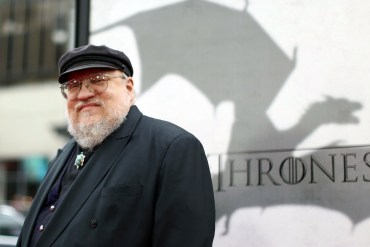This article contains spoilers for Game of Thrones season 1~7.
I stumbled into HBO’s flagship show Game of Thrones back in 2011—a casual viewing after random channel switching turned into punctual weekly gathering in front of the TV—slowly but surely my family and I were sucked in by the fascinating world, intriguing characters, and the show’s astonishing production value. Between Daenerys’ dragonlings and the ominous threat from beyond the Wall, the end of season 1 promised so much exciting story development that I couldn’t just wait until season 2 arrived to get my fix. I devoured all five A Song of Ice and Fire novels (it’s a shame that number remains unchanged after all these years) during the off-season. It’s fair to say that Game of Thrones is one of my favorite fictional universes of all time.
Besides watching the show bring our characters to life, the discussions between show-only fans quickly became the second favorite past-time for many book readers—including myself. It is refreshing to hear people speculate future plot developments, and reading their reactions to the story allows us to relive the precious moments we shared with the novels (even though it wasn’t that long ago for me.) It is an unspoken bond of camaraderie between show-only watchers and book readers—something that continuously draws readers to these Game of Thrones neophytes, despite message boards’ restriction of our presence, lest we accidentally spoil the Unsullied.
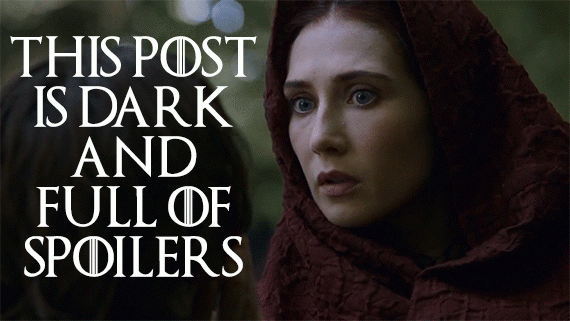
Aprils came and went, and the Starks rose and fell. All was well until season 5 aired, and boy was it terrible. It wasn’t one bad seed that poisoned the well, it was one bad entry after another, each trying to surpass the previous one. By the seventh episode, I was absolutely gobsmacked by just how awful the season was—it was almost as if I was watching an entirely different show! To say my enthusiasm for Game of Thrones was diminished was merely an understatement—the excitement I experienced in the past turned to ashes in my mouth, to misquote Tyrion. To people like me, season 5 and beyond is a giant rollercoaster of outrage, disappointment, and resignation. So, what the hell happened?
The quality of the show’s writing has dropped off a cliff across the board—plot, characters, and dialogue, none of them emerged unscathed. Now, as a member of online Game of Thrones communities, I noticed a common sentiment among show-fans: this rising discontent is nothing more than ramblings of book purists, and they should be promptly dismissed. While that may apply to certain subsets of the fandom (Elio & Linda, founders of westeros.org, and co-authors of The World of Ice and Fire were famously vocal against the show), the idea of divergence in stories doesn’t bother me and other less fanatic fans as Lord of the Rings did members of the Tolkien estate.
Adaptations are seldom 1:1 conversion between different media, any reasonable fan would understand that. For something the scale of A Song of Ice and Fire, compromises must be made in order to bring the fantastical world to mainstream television. I didn’t expect Euron Greyjoy to be his one-eye-blue-lip warlock self from the novels, and it only makes sense that certain dead-end storylines are modified or removed altogether from the show. With that said, it doesn’t mean that any comparison with the books is automatically invalid; George R. R. Martin’s novels provide a framework of “what could have been” when the show strays away from logic and common sense (in storytelling), and there is plenty wrong with the show.You remember Red Wedding? Well, how could anyone forget that? The Freys violated the sacred guest right (the Boltons and the Karstarks were technically guests themselves) by brutally murdering Northern and Riverland Lords and Ladies in their seats. The vile betrayal spelled the end for the Starks and the dream of an independent Northern Kingdom. It also put Game of Thrones in the center of the media spotlight. For a while, it’s the only thing people talk about— viewers grieve for the grim end their favorite characters met. The shocking story development dominated the news cycles. Countless articles about the traumatic event were written, and making reaction videos to the slaughter seemed to be the fashionable activity of the month. This surge in publicity has a bad influence on Game of Thrones.
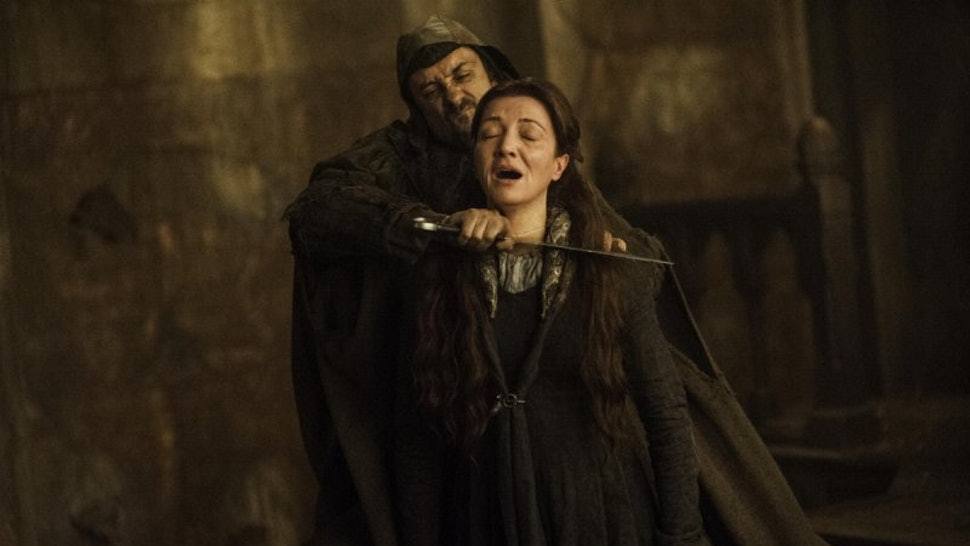
The Starks didn’t suffer gruesome deaths purely because Martin needed to spice things up; they were killed because they mishandled their allies by failing to secure an alliance with the Freys through marriage and alienating the Karstarks when Catelyn released Jaime Lannister. In George R. R. Martin’s A Song of Ice and Fire, mistakes rarely go unpunished, and the books never shock for shock’s sake. Show-runner David Benioff and D.B. Weiss (D&D for short) either mistook the reasoning behind these horrific deaths, or they didn’t care.
In D&D’s Game of Thrones, the shocking moments are themselves the end goal. After all, they got people talking about the show, so they must include as many as possible. These cheap narrative jolts take the form of (unnecessary) character deaths, gratuitous depiction of nudity and (sexual) violence—Game of Thrones effectively became medieval misery porn.
Take Ser Barristan the Bold (played by Ian McElhinney) for example: Barristan Selmy, the white-haired knight who later served under Daenerys was a legendary figure renowned in both honor and swordsmanship. When he was dismissed from the Kingsguard in favor of the Hound, he threatened to cut down his five Kingsguard brothers, and none dared to move as they were well aware of Selmy’s prowess—Barristan wasn’t just an accomplished tourney knight, he was also a battle-hardened veteran. But that didn’t save Barristan when a bunch of masked goons attacked him in a back alley of Mereen, as he was the designated victim of the week.
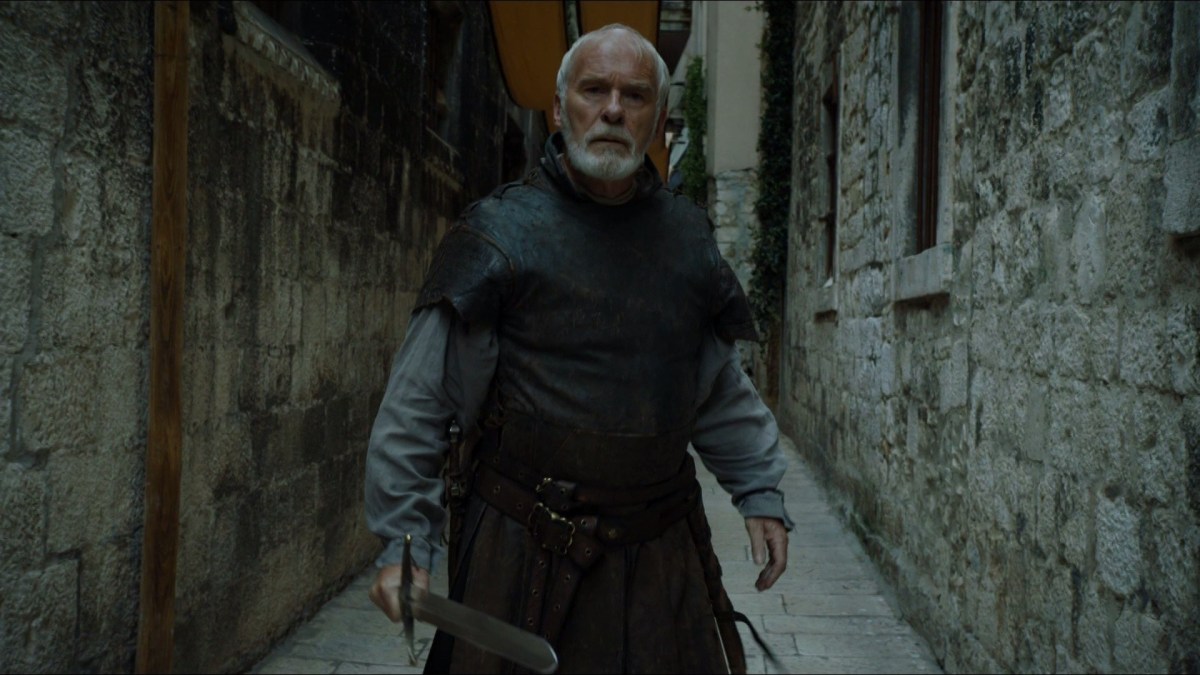
It’s frustrating enough that Barristan was killed off in such an unceremonious manner—The Sons of Harpy subplot was hastily dealt with and dropped when it’s time for Daenerys to sail to Westeros—his death says nothing of worth and has no lasting impact. Unfortunately, Barristan is far from the only poor case of showrunners’ downsizing attempt.
While Stannis Baratheon’s fate in the novels still hangs in the balance, the Stag King’s on-screen death is no less ridiculous and offensive than Barristan’s. A commander so brilliant that he smashed the Greyjoys at sea (naval warfare is arguably the only thing the Greyjoys are good at) was no match for Ramsay Bolton and his twenty good men in the end. I didn’t know whether to laugh or cry when dozens of tents in Stannis’s camp simultaneously combusted. There are many more who died a premature death in the show, and most of them were killed off so callously, it was as if D&D held great contempt for these characters. Stannis wasn’t the last to meet an early and undignified end—Dorne itself was one mind-numbing mass grave.
As disappointing as these deaths may be for book-readers and Ian McElhinney himself, we have to accept that the TV show is a separate entity, and it should be judged on its own merits. Not being able to see our favorite plotlines play out on screen is a shame to be sure, but that’s not reason enough to condemn the show, however, these characters need not depart the way they did.

I know I still sound like a book purist shaking my fist at the sky. You might ask, “whatever happened to being a levelheaded fan with reasonable expectations?” Earlier I mentioned that Game of Thrones sometimes strays away from logic and common sense, well, we’re now about to enter a new realm of bad writing where the story makes little sense even within the context of the show—the quality of writing deteriorated so much that even the show-only-viewers have picked it up.
There is a pattern to D&D’s writing, and it gets worse with each new season. The showrunners practice goal-oriented writing that cares not for how the story arrives at the desired “moment”, and sometimes the show literally doesn’t care how anyone got anywhere. Game of Thrones established in season 1 that it takes months to travel from King’s Landing to Winterfell, and season 7 is the worst offender in ignoring the physical size of Westeros. For the sake of plot contrivances, characters can be wherever they need to be. Petyr and Varys mastered the power of teleportation many seasons ago, and Euron’s Iron Fleet was able to sail around the bottom half of the continent in just one episode.
You may think logistics are merely a dressing that brings flavor to the show, but it is in fact an essential part of characters’ decision-making process, as demonstrated by Robb Stark promising to marry a Frey to secure passage through The Twins, or the Ironborn raiding the North with impunity, knowing the Northmen couldn’t defend themselves. I can go on and on. The point is, something always gets sacrificed when the story rushes from point A to B—even something as large as an entire character arc gets trampled in the process.
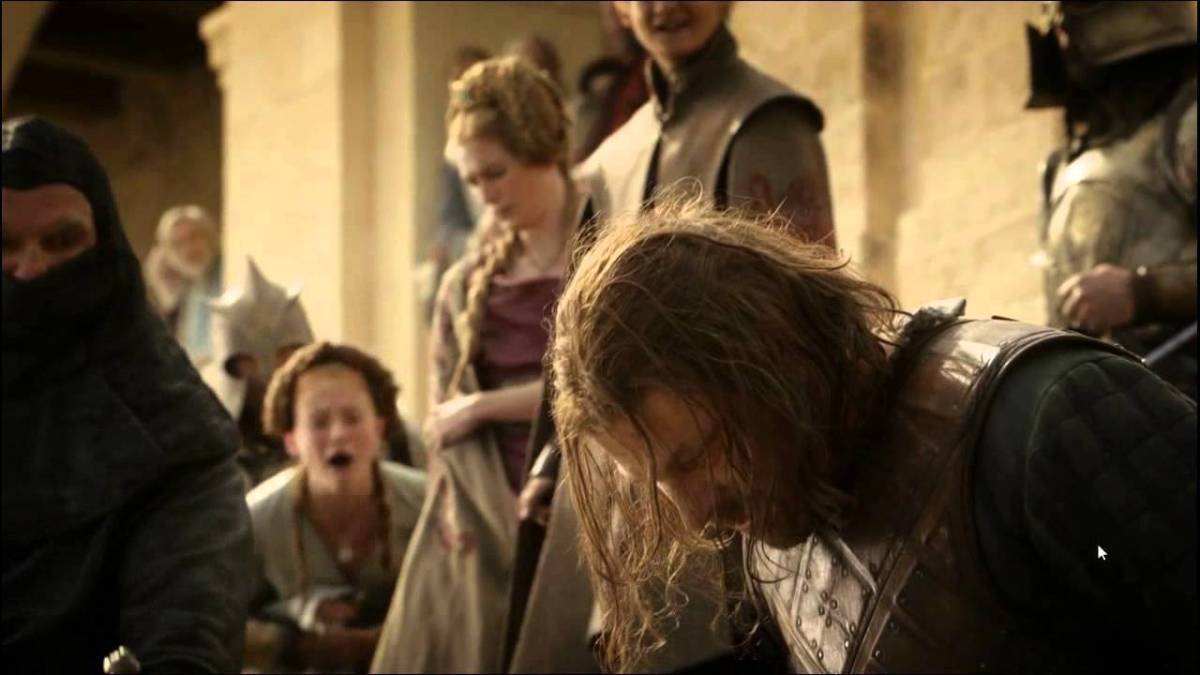
Sansa Stark spent the first half of the series as a hostage in King’s Landing after her father, Eddard Stark, was beheaded at the end of season 1. She learned about the game of thrones the hard way, and unfortunately, she could do nothing about her role as a pawn. But that changed when Petyr Baelish spirited her away during Joffrey’s assassination. Petyr became Sansa’s protector and mentor. While Petyr intended to use Sansa for his personal gain, she was slowly becoming a player herself. Most importantly, she started to learn to manipulate Petyr, one of the most dangerous and powerful men in Westeros (he has two Lord titles under his name.) Finally, Sansa Stark is a victim no more—she even has a new costume to signify her rebirth.
A natural progression of Sansa’s character arc from here on out should be “gather strength in the safety of the Eyrie”, “become a master strategist and schemer”, and finally, “avenge her family.” However, that was interrupted when D&D merged Sansa’s character with her childhood friend Jeyne Poole, and handed Sansa over to Ramsay as his latest of a long line of chew toys. By depriving Sansa of her newly gained agency, and reducing her to a damsel in distress, the show destroyed a season’s worth of character development; it did not recover until one-and-a-half season later after the Boltons were defeated.
The show needed an easy-to-hate villain after the death of Joffrey, and Ramsay Bolton was the perfect choice to fill the vacancy. Aside from granting him an unearned winning streak to rile up the viewers (routing Stannis and Yara with minimal effort), the show dedicated much screen time to the graphic display of his cruelty. Game of Thrones’s depiction of nudity and sex has always been gratuitous at best—the previous low points of the show were rape as literal backdrops as the Night Watch deserter occupied Craster’s Keep and Jaime raping Cersei because the writers didn’t understand what consent is. In the end, Game of Thrones managed to top itself once more and consummated the butchering of Sansa’s storyline by having Ramsay rape her in front of Theon.
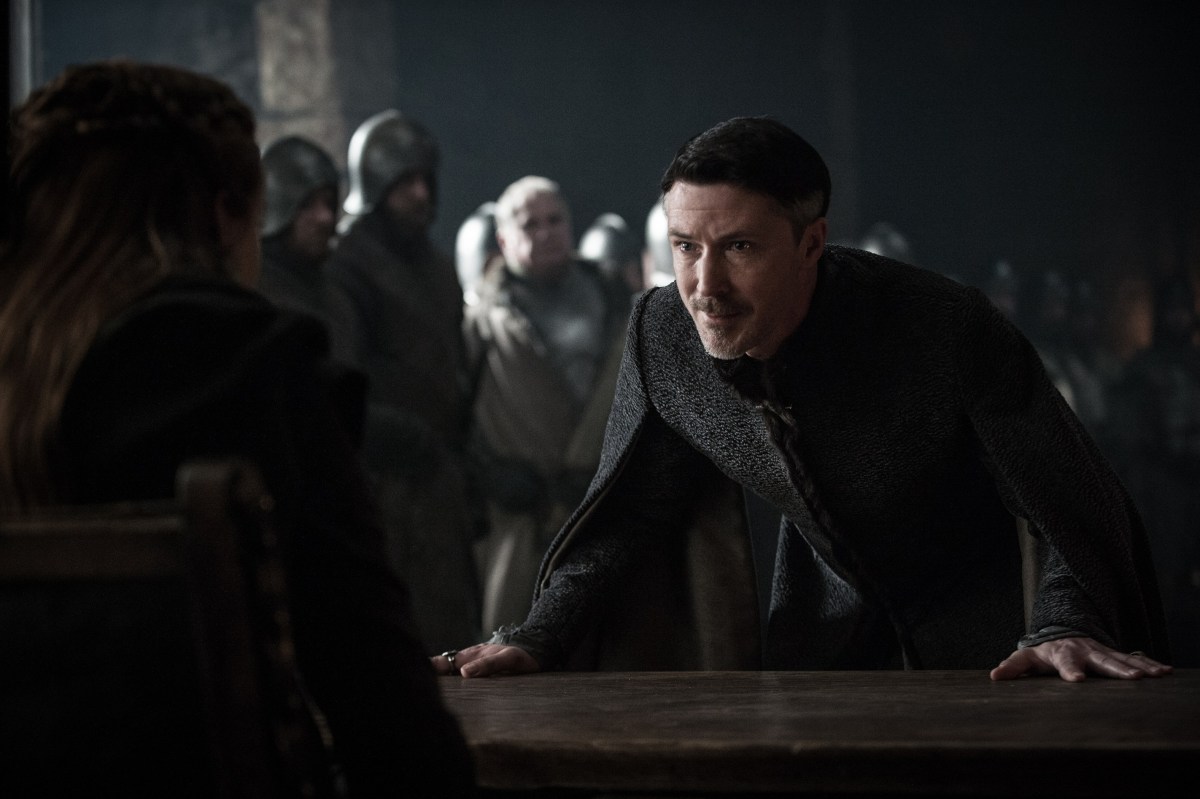
Some argued that sexual violence is a logical plot development given the nature of Ramsay’s character, but I want to raise the point that there was nothing logical about giving Sansa to the Boltons in the first place. Petyr allied with the Boltons in return for nothing when their rule over the North was tenuous (some may notice that D&D turned the fanatically loyal Umbers into a traitor House to make the Boltons look strong), and it also made zero sense for Petyr to openly antagonize the crown when he derived most of his power from the Lannisters. The man who rose from nothing to the Small Council and had set events in season 1 into motion was reduced to a fool.
The worst thing about the rape of Sansa, besides the utter tastelessness of it all, is that the apologists couldn’t even claim it was the often abused “sexual trauma as character development” technique in poorly written fictions when Sansa had been playing the victim for three seasons straight. It was all for shock—another heinous act written to prop up Ramsay as the big-bad.
The same tale of throwing logical progression out of the window in favor of dramatic, marketable moments continually repeats itself in season 5 and onwards. I can list examples of Game of Thrones’s poor writing all day long, such as how Jaime Lannister’s character arc is now a full circle—right back in a toxic relationship with his sister. But why does that matter? Some fans might say, “It’s a fantasy show. It’s not real!” Even actor Ian McShane himself dismissed Game of Thrones as “tits and dragons” despite a cameo appearance. Why take this seriously? Well, any good piece of fiction should follow the rules it set, and the show fails in that regard. An art form does not grow if consumers only mindlessly consume. Besides, Game of Thrones is a cultural phenomenon from a mainstream and well-respected medium, it requires exoneration from no one.
“If the show is so bad, then why did you keep watching it?” I hear this question a lot, and sometimes I ask myself the same. I guess I am invested. People accused disgruntled fans like me of hate-watching, but I don’t agree. I think I was hope-watching—wishing it would get better, and sometimes it did. Game of Thrones is full of “moments”, and occasionally brilliance shines through the muck—every once in a while I was rewarded with little interactions that reminded me what I loved about the show. Sometimes there was episode-long example of great adaptation: Hardhome was an excellent case of moving the story along while keeping with its character and lore.
As a book reader, I understand that season 8 may be the only closure we are going to get. G.R.R.M. is not exactly the most focused writer in the world—he is often distracted by football matches and other writing projects. Though Martin was displeased by the ultimate direction of the show, so far his desire to “set the records straight” has only brought us a few preview chapters closer to The Winds of Winter, which isn’t even the conclusion to the series. I don’t know whether the final season to Game of Thrones will be a return to form of its early glory or a continuation of the post-book-free-form, but I know it has an ending, and my Watch can finally be over.
To help us continue to create content, please consider supporting us on Patreon: https://www.patreon.com/filmera

